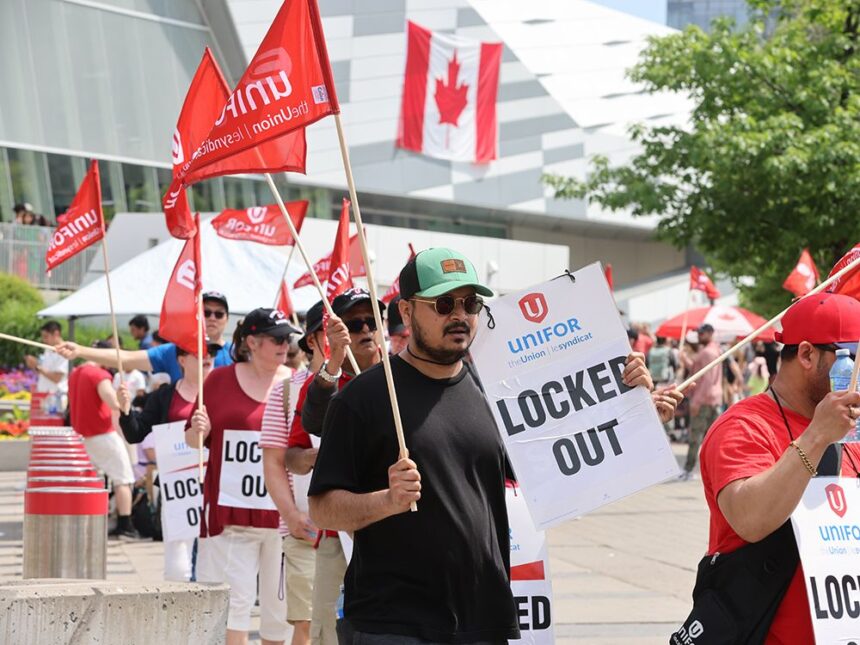The iconic silhouette of Toronto’s skyline faces a growing storm as CN Tower workers enter their second week of lockout, casting a shadow over upcoming Canada Day celebrations. As someone who’s covered this city’s ups and downs for over a decade, I can tell you this standoff has become more than just a labor dispute – it’s evolved into a symbol of post-pandemic economic tensions reshaping our city.
Walking past the tower yesterday, I noticed the unusually quiet plaza where typically thousands of tourists would be lining up. The 553-meter structure stands eerily dormant as approximately 300 workers represented by Unifor Local 7 remain locked out after negotiations between the union and Canada Lands Company collapsed.
“We’re fighting for fair wages that actually reflect the cost of living in Toronto,” explained Sarah Thornton, a CN Tower operations specialist I spoke with at the picket line. “Many of us helped keep this landmark running through COVID, and now we’re being treated as disposable.”
The dispute centers primarily on wages, with workers seeking increases that match Toronto’s soaring inflation rate, particularly housing costs which have risen nearly 17% since last year according to the Toronto Regional Real Estate Board.
Canada Lands Company, the federal Crown corporation managing the CN Tower, maintains their latest offer was reasonable. “We’ve proposed a competitive package that balances employee needs with fiscal responsibility,” their spokesperson stated in an email response to my inquiry.
The timing couldn’t be more problematic for Toronto’s tourism sector. City tourism officials estimate the CN Tower typically welcomes over 15,000 daily visitors during summer months, with Canada Day weekend traditionally seeing peak numbers. Local businesses are already feeling the impact.
“We’ve seen about a 30% drop in foot traffic this week,” Marcus Wong told me from behind the counter of his souvenir shop on Front Street. “The tower is why people come to this part of downtown. No tourists at the tower means no customers for us.”
The economic ripple effect extends beyond retail. Several specialized technical workers who maintain the tower’s complex systems expressed concerns about both immediate financial hardships and long-term career implications.
“This isn’t just about missing paychecks,” explained Carlos Mendez, an electrical systems specialist who’s worked at the tower for 14 years. “These systems require constant maintenance. Extended downtime creates technical challenges that will linger long after any agreement is reached.”
For many Torontonians, including myself, the situation reflects broader tensions in our post-pandemic economy. The contrast between Toronto’s booming development and the financial struggles of service workers has rarely been so visible.
Tourism industry analyst Patricia Kim with the Toronto Convention and Visitors Association points to potentially lasting damage. “The CN Tower isn’t just an attraction – it’s Canada’s most recognizable landmark. Extended closure damages Toronto’s international tourism reputation at a critical recovery moment.”
City officials appear increasingly concerned. Mayor Olivia Chow’s office released a statement yesterday urging both sides to resume negotiations, noting the “significant cultural and economic importance of resolving this dispute before Canada Day celebrations.”
Federal Labor Minister Seamus O’Regan’s office confirmed they’re monitoring the situation but have not indicated plans to intervene. With federal ownership through Canada Lands Company, some union representatives argue Ottawa bears responsibility for resolution.
As Canada Day approaches, alternative celebration plans are hastily being arranged. The annual fireworks display, typically viewed from the tower’s observation deck by contest winners and VIPs, will likely be relocated or reimagined according to city events coordinator Jennifer Singh.
For tourists like the Martinez family from Mexico, who I met photographing the tower from behind barricades, the closure means significant disappointment. “We planned our entire Canadian vacation around visiting the CN Tower,” Maria Martinez explained while showing me their pre-purchased tickets on her phone. “Now we don’t know what to do instead.”
Local hospitality workers express solidarity despite their own financial impacts. “Yeah, we’re losing shifts and tips,” acknowledged Devon Williams, a server at a nearby restaurant. “But if CN Tower workers win better wages, it raises standards for all of us in tourism and hospitality.”
As negotiations remain stalled, both sides seem prepared for a prolonged dispute. Union representatives have organized a community support rally for this weekend, while management has begun communicating extended closure contingencies to tourism partners.
Walking back to my office along Front Street yesterday afternoon, watching picketing workers against the backdrop of Toronto’s most famous structure, I couldn’t help reflecting on how this standoff encapsulates broader questions about who benefits from our city’s recovery and growth – questions that will likely persist long after this particular dispute is resolved.







